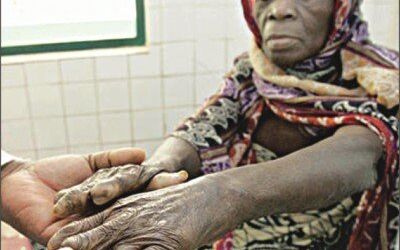Although Bangladesh has made a commendable progress in control of leprosy, the disease still poses a considerable public health threat in certain areas. People with leprosy are cured significantly with successful medical treatment. But the stigma and social isolation becomes a major concern for thousands of people who live with permanent disfigurements caused by the disease. They face more extensive social and psychological adverse impacts than many people consider. But the problem is frequently overlooked and neglected.
There is urgent need to address the affected persons by providing proper care and rehabilitation. People face injustice from leprosy-related stigma and discrimination. Even though leprosy is now totally curable, thousands of people are experiencing rejection everyday from near and dear ones of their families, society and communities they belong to. We must help them live with dignity and protect their rights.
The elimination goal was set by World Health Organisation (WHO) and that is less than 1 per 10000 populations. Bangladesh has achieved nationwide goal by the end of 1998, 2 years before the set target. It stands at 0.28 per 10,000 populations at the end of 2009.
Several areas like Dhaka and Chittagong Metropoliton, certain districts (Nilphamari, Bandarban, Khagrachari, Gaibandha), are still burdened with high number of patients with leprosy. They need particular attention in the context of treatment and stigma. Many people of that area believe leprosy is a curse. Widespread awareness in those communities is much needed. The rising awareness will motivate more people to seek treatment and will make a difference in the life of people who already living with leprosy.The awareness should not only aim at treatment, but also to remove stigma related to the disease. Eight NGOs are assisting the Government in MDT (Multi-drug Therapy) services which are running in 31 districts (272 upazilas) of the country. There are 625 MDT Centers at upazila (sub-district) and lower level, 3 Government leprosy hospitals and 8 NGOs leprosy hospitals in Bangladesh are in action to provide treatment.
Such set up is sufficient to provide treatment but sometimes we need more than just proving free drugs. People who are living with permanent disfigurement and incurable by drug desperately need our assistance to live like a normal member of the society, to exercise their rights which are often violated. We need to ensure justice and protect their rights.
Prof Pravat Chandra Barua
Line Director, National Tuberculosis Control Programme (NTP) and National Leprosy Eradication Programme (NLEP) under Directorate General of Health Services (DGHS).
Source: The Daily Star, February 13, 2010





 Research found breakthrough treatment of HIV/AIDS
Research found breakthrough treatment of HIV/AIDS
Leave a Reply